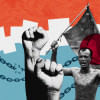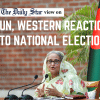Is post-uprising Bangladesh on the right track?

The July uprising in Bangladesh marked a pivotal moment in the nation's political history. The student-led mass uprising culminated in the resignation of former Prime Minister Sheikh Hasina on August 5, after 15-plus years of authoritarian rule, which sparked widespread hope for transformative change. Dr Muhammad Yunus, a Nobel laureate, subsequently emerged as the leader of an interim government, supported by the revolutionaries and civil society members. Yet, despite the apparent potential for radical reform, the new administration's cautious approach has led to some having doubts about its revolutionary capacity.
In the aftermath of Hasina's departure, an opportunity for deep structural reforms emerged, with key institutions such as law enforcement, judiciary and bureaucracy in disarray. However, the interim government chose to operate within the boundaries of the existing constitution, which has become a constraint on transformative action.
This restrained approach may ultimately jeopardise the July uprising goals. Prof Asef Bayat's book on the Arab Spring, titled Revolution Without Revolutionaries, serves as a poignant reminder of this phenomenon. According to Bayat, most Arab Spring movements failed because they lacked both a cohesive revolutionary ideology and charismatic leaders who could sustain momentum. Without these elements, initial victories were quickly followed by stagnation, as rival factions struggled to unite behind a common vision.
The interim government's stated goal of establishing a liberal democracy may be overly idealistic given Bangladesh's current social and political landscape. As scholars Sharon Bailin and Harvey Siegel argue, a liberal democracy requires a citizenry capable of critical engagement with political issues, media scrutiny, and overall democratic citizenship. In Bangladesh, however, the majority of the population is more immediately concerned with issues of livelihood and economic stability. The average citizen, grappling with day-to-day challenges, may lack both the time and resources needed to participate meaningfully in a liberal democratic system. As a result, the lofty ideals of liberal democracy may prove impractical in a country where survival takes precedence over civic engagement.
Furthermore, William A Galston's research indicates that economic instability often leads to democratic backsliding, as public frustration with financial crises erodes faith in democratic institutions. Prof Asef Bayat also suggests that a lack of radical economic reforms also led to the Arab Spring's failure. That said, Bangladesh is currently facing a dire economic situation, with inflation and rising commodity prices affecting the everyday lives of its people. In such a climate, it is unlikely that the public will support a prolonged period of political experimentation or reform, especially if it fails to alleviate economic hardship. Instead, the immediate focus is on practical solutions to pressing economic issues, which makes the establishment of a liberal democracy under current conditions a challenging, if not impossible, prospect.
Another critical barrier to Bangladesh's democratic aspirations lies in the deep-seated criminalisation of its politics. For decades, Bangladeshi politics has been polarised and driven by a narrative that pits political factions against each other in an "Us vs Them" dichotomy. Jamaat-e-Islami, for instance, has long been branded an antagonist based on its stance on the 1971 Liberation War, while the BNP has frequently been vilified because of siding with Jamaat. The July uprising has introduced yet another divisive label into the political discourse: the characterisation of the Awami League as a mass killer. This label, born of the uprising, will likely continue to influence political dynamics, casting a shadow over the Awami League's legitimacy and reinforcing a cycle of labelling that exacerbates divisions. This culture of mutual delegitimisation creates an environment where peaceful resolution and constructive dialogue are nearly impossible, as each party is more invested in undermining its rivals than in finding common ground.
Given these obstacles, Bangladesh's path to liberal democracy seems fraught with challenges that cannot be overcome through conventional means. Instead, a more pragmatic approach may be required—one that balances the ideals of democratic reform with the realities of Bangladesh's sociopolitical landscape. A multiparty government, focused on economic stability and educational reform, could serve as a transitional solution that addresses the immediate needs of the population while laying the groundwork for democratic development in the future. Such an arrangement would provide a platform for various political factions to collaborate, fostering a spirit of cooperation that could help ease long-standing tensions.
In the long term, this approach may prove more sustainable than either a rushed election or the installation of a non-elected, apolitical regime, both of which are likely to face significant resistance from the population. An immediate election, for instance, would risk intensifying divisions, as parties vie for power without addressing the underlying sociopolitical issues that led to the uprising in the first place. Through the existing political mechanism, it is highly unlikely to bring radical changes and realise liberal democracy. Rather, the existing unconsolidated democracy created an autocrat like Sheikh Hasina. Similarly, a non-elected government would lack the legitimacy needed to make impactful decisions, making it vulnerable to both internal and external pressures. In contrast, a multiparty government with a strong focus on economic stability and education would offer a more balanced path forward, gradually building the foundations of a liberal democracy without inciting further unrest.
This pragmatic approach could lay the groundwork for a more stable and inclusive political landscape, allowing the nation to progress towards its democratic aspirations without repeating the cycles of upheaval that have characterised its past.
Dr Shafi Md Mostofa is post-doctoral research fellow at the Democracy Institute, Central European University, Hungary, and associate professor at the Department of World Religions and Culture, University of Dhaka.
Views expressed in this article are the author's own.
Follow The Daily Star Opinion on Facebook for the latest opinions, commentaries and analyses by experts and professionals. To contribute your article or letter to The Daily Star Opinion, see our guidelines for submission.


 For all latest news, follow The Daily Star's Google News channel.
For all latest news, follow The Daily Star's Google News channel. 









Comments